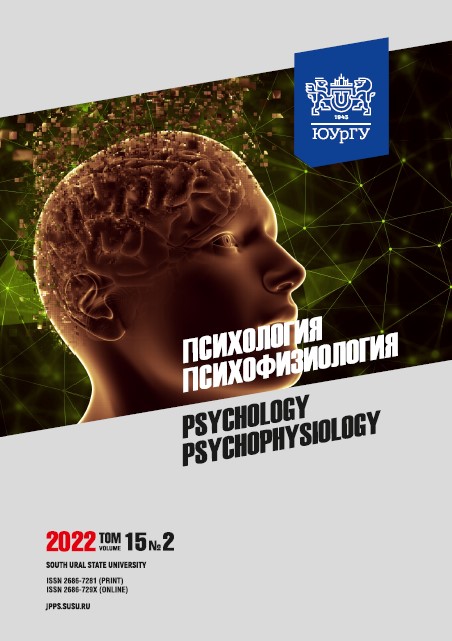Explanation in psychology: from reduction of mental to a psychological theory of explanation
Abstract
Introduction: the second half of XX century is characterized by the active development of methods of psychological research and their classifications. In Russian psychology, the most popular classification was proposed by B. Ananyev. However, this classification, as well as many others, practically does not pay attention to the explanation of research results, which is often replaced by their interpretation. The models proposed in psychology (J. Piaget, R. Brown, A. Yurevich, etc.) cannot be considered as theories of explanation, which leads to the use of typical research strategies: analytical explanation, mental-to-non-mental reduction, mental-to-causal reduction. Aims: the paper discusses a new approach to the theory of explanation in psychology based on the integration of explanation in the subject of psychology. Theoretical Basis: based on the principle of the unity of logic and history the paper contains a brief historical analysis of the development of methods of psychological research and explanation. The results obtained come from the analysis of modern research on the problem of the subject and explanation in psychology. Results: understanding the subject of psychology as a person's inner world can be used to develop a theory of explanation in this field. The inner world is supposed to have a multilevel structure, which makes it possible to implement structural-level approach to mental phenomena. The level structure of the inner world characterized by dynamic, genetic, functional, and other relationships makes it possible to integrate explanation into the subject of psychology. Conclusion: the results obtained provide opportunities for the development of a modern classification of explanations in psychology based on the nature of inter-level relations in the structure of a person's inner world. The study makes it possible to outline the ways of developing the theory of explanation in psychology with respect to the need to integrate explanation into the subject of psychology.
Downloads
References
2. Ananev B.G. O problemakh sovremennogo chelovekoznaniia [On the problems of modern human science]. Moskow. Nauka. 1977:382. (In Russ.).
3. Pirov G.D., Tsanev T.P. Experimental psychology. Sophia. Nauka i izkusstvo. 1973:424.
4. Mazilov V.A. Predmet psihologii [Subject of Psychology]. Yaroslavl. RIO YGPU. 2020:175. (in Russ.).
5. Piazhe Z.H. The nature of the explanation in psychology and psychophysiological parallelism. Fress P., Piazhe Z.H. Eksperimentalnaia psihologiia = Experimental psychology. Moskow, Progress. 1966;1,2:157–194. (in Russ.).
6. Yurevich A.V. Explanation in psychology. Psihologicheskii zhurnal = Psychological journal. 2006;27(1):97–106. (in Russ.).
7. Mazilov V.A. The subject of psychological science and the problem of explanation in psychology. Article One: Difficulties of Explanation. Vysshee obrazovanie segodnia = Higher education today. 2020;6:69–76. (in Russ.).
8. Mazilov V.A. Explanation in psychology. The subject of psychological science and the problem of explanation in psychology. Article two. Towards a New Concept of Explanation. Vysshee obrazovanie segodnia = Higher education today. 2020;7:59–65. (in Russ.).
9. Koltsova V.A. Istoriia psihologii: Problemy metodologii [History of Psychology: Problems of Methodology]. Moscow. IP RAN. 2008:512. (in Russ.).
10. Nikitin E.P. Obiasnenie – funktciia nauki [Explanation is a function of science]. Moscow. Nauka. 1970:280. (in Russ.).
11. Nikitin E.P. On the nature of justification. Voprosy filosofii = Philosophy questions. 1979;10:46–55. (in Russ.).
12. Nikitin E.P. Explanation and prediction [Explanation and prediction]. Logika i empiricheskoe poznanie [Logic and empirical knowledge]. Moscow. Nauka. 1972:114–133. (in Russ.).
13. Gempel K.G. Logika obiasneniia [Logic of Explanation]. Moscow. Dom intellektualnoi knigi. Russkoe fenomenologicheskoe obshchestvo. 1998:237. (in Russ.).
14. Hempel C.G., Oppenheim P. Studies in the Logic of Explanation. Philosophy of Science. 1948;15(2):135–175. DOI: https://doi.org/10.1086/286983.
15. Mazilov V.A. Scientific fact in psychology: structural-level approach. Vestneyk Rossiiskogo fonda fundamentalnykh issledovanii. Gumanitarnye i obshchestvennye nauki = Bulletin of the Russian Foundation for Basic Research. Humanities and social sciences. 2018;1(90):133–142. (in Russ.).
16. Shadrikov V.D. Towards a new psychological theory of ability and giftedness. Psihologicheskii zhurnal = Psychological journal. 2019;40(2):15–26. (in Russ.).
17. Shadrikov V.D. Mir vnutrennei zhizni cheloveka [The world of a persons inner life]. Moscow. Logos. 2010:392 (in Russ.).
18. Shadrikov V.D. Sposobnosti i odarennost cheloveka [Human abilities and giftedness]. Moscow. IP RAN. 2019:274 (in Russ.).
19. Yudin E.G. Metodologiia nauki. Sistemnost. Deiatelnost [Methodology of Science. Consistency. Activity]. Moscow. Edithorial URSS. 1997:444. (in Russ.).
20. Rogovin M.S. Strukturno-urovnevye teorii v psihologii (metodologicheskie osnovy) [Structural-level theories in psychology (methodological foundations)]. Yaroslavl. YrGU. 1977:80. (in Russ.).
21. Cheremoshkina L.V., Mooreafa S.V. Mnemonic abilities of children 7-12 years old with mental retardation. Voprosy psihologii = Psychology issues. 2011;5:34–44. (in Russ.).
22. Cheremoshkina L.V., Osinina T.N. Mnemic abilities during the transition from adolescence to adolescence (based on the materials of a longitudinal study). Psihologicheskii zhurnal = Psychological journal. 2020;41(6):35–47. (in Russ.).
23. Cheremoshkina L.V., Osinina T.N. The mnemonic abilities of schoolchildren as a factor in the success of the reproduction of educational material. Psihologiia obucheniia = Psychology of learning. 2011;4:21–35. (in Russ.).
24. Loginova N.A. Antropologicheskaia psihologiia Borisa Ananeva [Anthropological psychology of Boris Ananyev]. Moscow. IP RAN. 2016:366. (in Russ.).
References on translit
-Copyright (c) 2022 Psychology. Psychophysiology

This work is licensed under a Creative Commons Attribution-NonCommercial-NoDerivatives 4.0 International License.



